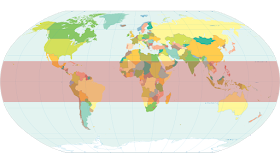Science has warned us that climate change isn't going to be linear. It isn't going to be a gradual, steady progression. It will come in sometimes jarring blows.
One of these jarring blows is just a few years away. The name they've given it is "climate departure." It refers to a transition that will be sweeping the world beginning around 2020 in the tropics and spreading into the northernmost regions by 2047.
I read about this today over at Lorne's blog, Politics and Its Discontents. He mentioned a new study that sounded eerily like something I read in a research paper two or three years ago. I followed the links back to the summary of the latest study and, sure enough, it mentioned that there had been several papers that came to the same conclusions. Damn.
Climate departure in going to be an abrupt process whereby a new climate displaces the old climate. In the new climate, every year will be hotter than the hottest recorded year of the old climate. Every year. Hotter than the hottest. Perpetual extreme heat and more, much more.
...climates without modern precedents could cause large and potentially serious impacts on ecological and social systems1–5. For instance, species whose persistence is shaped by the climate can respond by shifting their geographical ranges4–7, remaining in place and adapting 5,8, or becoming extinct 8–11. Shifts in species distributions and abundances can increase the risk of extinction 12, alter community structure3 and disrupt ecological interactions and the functioning of ecosystems. Changing climates could also affect the following: human welfare, through changes in the supply of food13 and water14,15; human health 16, through wider spread of infectious vector-borne diseases, through heat stress 19 and through mental illness 20; the economy, through changes in goods and services 21,22; and national security as a result of population shifts, heightened competition for natural resources, violent conflict and geopolitical instability 23. Although most ecological and social systems have the ability to adapt to a changing climate, the magnitude of disruption in both ecosystems and societies will be strongly determined by the time frames in which the climate will reach unprecedented states1,2. Although several studies have documented the areas on Earth where unprecedented climates is likely to occur in response to ongoing greenhouse gas emissions 24,25, our understanding of climate change still lacks a precise indication of the time at which the climate of a given location will shift wholly outside the range of historical precedents.
Does that sound apocalyptic? Well it kind of does, doesn't it? Most ecological and social systems can adapt to a changing climate, provided it's gradual and over many centuries. That sort of benign change is not what's expected from Climate Departure.
The first in line to receive a Climate Departure working over are the tropics. The earlier report singled out a few areas that could be hit by 2020, among them the Caribbean nations.
What begins in 2020 will move through the tropics and then spread poleward, arriving in the Arctic around 2047. Here's a map of the tropical zone.
What the chart shows is most of Africa, the greater part of South America, a big chunk of India and Southeast Asia are in the crosshairs for early impact climate departure. What's also notable is how little territory/refuge remains in the Southern Hemisphere. The main refuge is to the north into China, Russia, Europe and North America. North Africa and the Middle East are desert, that won't help.
So, if climate departure does kick off in 2020 as these reports suggest, we've only got a few years to figure out what we're going to do when the migrants come knocking. These certainly are interesting times. Wish they weren't.
















